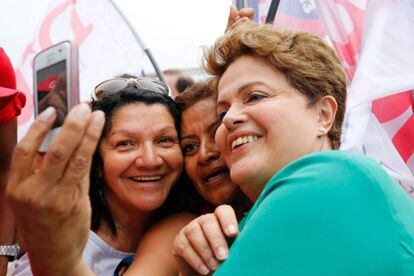Rousseff widens lead in Brazil polls
With round one of presidential elections on October 5, incumbent draws away from Silva


Despite being completely hoarse, former Brazilian president Lula da Silva delivers one of his passionate speeches, which galvanizes the audience. He then introduces fellow Workers Party (PT) member Dilma Rousseff, the current president of the nation, who rouses the crowd with an equally broken voice.
A member of the audience, a primary school teacher named Sergio Cutme, notes that voter intention polls are increasingly favoring the incumbent. And he is right: two surveys published simultaneously confirm that Rousseff has taken back the lead at the end of the campaign after temporarily running second to Marina Silva of the Brazil Socialist Party (PSB).
It’s not about making politics for the people, but with the people”
Marina Silva, Socialist contender
Both Datafolha and Ibope, which conduct the country’s leading polling of voters, show that the president has widened the lead between herself and Silva, just days ahead of the first round of the presidential election on Sunday.
While both women were neck and neck in early September, there is now a 15-point difference between them. The third contender with a chance to perform well at the polls, the conservative Aécio Neves, has risen in popular support and could even secure more votes than Silva, the latest polls show.
But Rousseff hardly mentions the results at the rally, nor does she talk about the stock market, which fell considerably after it emerged that the president is poised for re-election, illustrating her poor relations with the world of finance.

Instead, she has spent all last month depicting herself as the only candidate able to preserve the Workers Party’s achievements throughout the last 12 years.
“Who has the experience and the power to maintain all that? Who lifted 36 million Brazilians out of poverty?” exclaims Rousseff, for whom this new middle class represents an important voter base.
Then she looks around and says: “This is a special place for us.” The buildings around Avenida Silva Samelo, in the sprawling southern periphery of São Paulo, make up a blue-collar neighborhood where entire families, friends and factory colleagues filed down the streets to attend a classic PT rally.
Meanwhile, the Socialist hopeful brought a very different act to São Paulo. Marina Silva and her vice-presidential nominee Beto Albuquerque gathered around 200 supporters inside a room with chairs, and talked to indigenous community leaders, gay groups, women’s associations, sociologists, artists, salespeople, entrepreneurs, students and unionists.
“It’s not about making politics for the people, but with the people,” said Silva into the microphone.
“This is a celebration of diversity,” she added, pointing at the fact that she is aiming for a broader voter base than the PT, which focuses on the poor.
Later, with tears in her eyes, Silva complained about the attacks she has been getting from the PT: “They say that Marina is a dreamer, and that this is no good to be a president. But I say that the most specific raw materials that go into politics are dreams.”










































